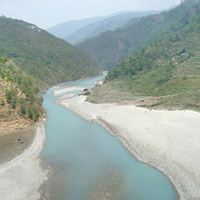PDA negotiations at final stage

Upper Karnali Hydropower Project
Negotiations between Investment Board Nepal (IBN) and India’s GMR-ITD Consortium on a power development agreement (PDA) for Upper Karnali Hydropower Project have entered the final stage, with informed sources suggesting that an initial deal could be reached in the next couple of days.
The IBN, which has been mandated to hold the PDA talks, and the GMR have been engaged in discussions for the last five days. As per IBN plan, an initial agreement could be signed by Wednesday, before it is tabled at the IBN board chaired by Prime Minister Sushil Koirala for endorsement.
“We are engaged in making the final draft of the PDA and discussing the terminologies,” said an IBN source.
According to the source, the issues figured in this round of talks were use of the transmission lines to be built for the Upper Karnali for other projects, purchasing the transmission lines by Nepal if required at a later date, and giving Nepal first priority to buy the power remaining after GMR has signed a PPA to sell 55 percent of the energy generated to another party.
The other issues being discussed are categorisation of force majeure and termination compensation. “In any PDA, there are two major issues, categorisation of force majeure and termination compensation,” said the source. The government will not be legally responsible in case of natural force majeure while it will have to compensate the developers in the event of political force majeure.
“We’re currently defining events that come under political force majeure and trying to limit the number of such events,” said the source. The provisions under termination compensation are much better than those for the Khimti and West Seti projects, added the source.
Similarly, the two sides have been discussing whether Nepal will get dividends as it is getting 27 percent free equity in the Upper Karnali project. The IBN will be holding talks with major political parties before inking the final PDA. According to the IBN, controversial issues figured in the 2008 memorandum of understanding between Nepal government and the GMR has been addressed in the PDA. It has also asked the GMR to allow future power projects to use the transmission lines that it will erect to evacuate power from the Upper Karnali project. The GMR has been given two years to make the financial closure and five years to complete the construction of the project.
After concluding the accord with the GMR, the board will hold PDA talks with another Indian power developer Sutlej Jalvidyut Nigam for the 900 MW Arun 3 Hydropower Project located in eastern Nepal.
Both the IBN and the GMR stand to benefit from the new Financial Act that has granted tax exemption to developers—something they have been demanding for some time. Power projects will get a 100 percent income tax exemption for the first 10 years and a 50 percent exemption for another five years. In order to qualify for the benefit, they have to generate electricity and feed it to the national grid by fiscal year 2020-21. The developers will also get a subsidy of Rs 5 million per MW.
The Upper Karnali and Arun 3 projects will be developed under the Build-Own-Operate-Transfer (BOOT) model. The power developers will hand over the projects to the Nepal government after operating them commercially for 25 years.
Nepal would earn Rs 800 billion from the two projects over that period, according to the IBN.
Both GMR and Sutlej have agreed to provide 12 percent and 21 percent free energy to Nepal from Upper Karnali and Arun 3 respectively. Nepal will get 305 MW of free electricity from the two projects worth Rs 247 billion.
Energy Ministry barred from water resource meet in Delhi
The government has decided not to attend the eighth meeting of the bilateral energy secretary-level Joint Committee on Water Resources (JCWR) planned to take place in New Delhi. According to a minister, the Cabinet took the decision amid controversy over the ‘Cooperation in Power Sector’ agreement draft forwarded by India and the Energy Ministry not divulging much about the agenda for the JCWR.
The Cabinet had reservations about the Energy Ministry’s reluctance to table the agenda of the JCWR meeting and discuss them with line agencies including the Foreign Ministry.
“As the Energy Ministry forwarded the proposal at the last moment, our participation in the meeting was cancelled,” said a minister who attended the meeting. “The Energy Ministry didn’t present the complete agenda of the JCWR. They only sought Cabinet nod for the meeting,” said the minister.
Foreign Minister Mahendra Pandey confirmed that the Nepali side was not taking part in the scheduled meeting as the details of the homework were not reported. With the Energy Ministry not divulging details, not much is known about the contents of the draft forwarded by India. Sources say very few, including senior officials, have access to the closely guarded document. The southern neighbour had recently forwarded the draft to the ministry in response to the Power Trade Agreement sent by Nepal in 2010.
The document sent by India, according to sources, mentions that no major hydropower project could be developed in Nepal without India’s consent. “How can we allow our officials to attend such a crucial meeting without the Cabinet endorsing the agenda,” said a highly-placed government source. A Cabinet nod is necessary for a meeting of high importance.
The delegation for the July 20-21 meeting was supposed to be led by Energy Secretary Rajendra Kishore Kshetri. Nepali Embassy sources in New Delhi said they were informed three days ago that the energy secretary would be coming to India.
Meanwhile, the Energy Ministry has agreed to share the contents of India’s proposal with other ministries. Energy Minister Radha Gyawali, during Friday’s Cabinet meeting, agreed to share the document following criticism from her Cabinet colleagues.
Source : eKantipur.com


